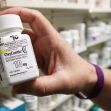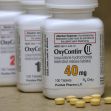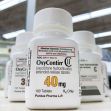Each episode of Netflix’s new blockbuster series Painkiller begins with a disclosure that explains the story about to be televised is partly fiction. But, the people introducing the show also reveal that they are the real parents of a son or daughter who died from various conditions caused by their OxyContin addiction.
The U.S. Centers for Disease Control and Prevention reported in 2021 that more than a million people in the U.S. have died from drug overdoses since 1999. OxyContin and other natural and synthetic prescribed opioids have been responsible for more than half of these.
Spoiler alert. At the end of the six chilling Painkiller episodes, viewers learn that the Sackler family, which manufactured, marketed, and made millions from the drug “most blamed for the U.S. opioid epidemic,” settled their Bankruptcy Court suit for approximately $6 billion that they will pay to victims in order to end thousands of pending lawsuits. In addition, the Sacklers, headed by CEO Richard Sackler and including eight other family members, would personally be shielded from any other tort lawsuits. The New York Times estimates that the Sacklers' net worth is around $13 billion. They declared bankruptcy for their Purdue Pharma LLP in 2019 and reorganized the company, but the family “withdrew billions of dollars” before the filing.
At the request of the U.S Trustee, the Department of Justice official “responsible for the integrity of the bankruptcy system,” U.S. Solicitor General Elizabeth Prelogar asked the Supreme Court to intervene by challenging the settlement that was made by a U.S. bankruptcy court and approved by Judge Eunice Lee of the New York-based 2nd Circuit Court of Appeals in May.
Lee said that the “legal claims against Purdue were inextricably linked to claims against its owners, and allowing lawsuits to continue targeting the Sacklers would undermine Purdue’s efforts to reach a bankruptcy settlement.” Reuters reported that Judge Richard Wesley “reluctantly” agreed that the protections for the Sacklers were legal, but he also urged the Supreme Court to “clarify the issue.”
Prelogar argued that bankruptcy law prohibits the Sacklers from seeking bankruptcy protection for Purdue, but allows them to be released from all future claims. Supreme Court Justice Sonia Sotomayor granted the Justice Department's application for a stay with no dissenting votes. Her order directed the parties to brief and argue the following question: “Whether the Bankruptcy Code authorizes a court to approve, as part of a plan of reorganization under Chapter 11 of the Bankruptcy Code, a release that extinguishes claims held by nondebtors against nondebtor third parties, without the claimant’s consent.”
The central issue in the case, thus, is not whether the Sacklers should be able to avoid further civil accountability, but whether the Bankruptcy Court is allowed to approve the settlement. Opponents of the reorganization are against allowing Purdue to restructure in a way that permits the Sacklers to get legal protections for their personal wealth. While Purdue filed for bankruptcy, individual family members have not, and reports say they still have at least $3 billion more protected from the settlement.
If the Painkiller series is factual, it tells the story of how, beginning in 1996, sexy female pharmaceutical sales representatives, using all their charm and more, convinced doctors to prescribe OxyContin because it was less addictive than other painkillers. In fact, as one of the characters noted, it was actually “candy-coated heroin.”
Not only did the Purdue Pharma sales reps convince doctors to prescribe the drug, but they also constantly urged them to continually increase recommended dosages. Massachusetts Attorney General Maura Healey, of one of the states that originally sued Purdue Pharma, said the company used “Coffee, ice cream, catered lunches, and cash” to induce doctors to prescribe the drug. She also told Fierce Pharma, a news blog that covers the “latest news on drugs and the companies that make them,” that Purdue used “face to face” interactions between salespeople and doctors “in order to avoid witnesses and a paper trail.”
Prelogar’s court papers say, “The plan’s release ‘absolutely, unconditionally, irrevocably, fully, finally, forever and permanently’ releases the Sacklers from every conceivable type of opioid-related civil claim – even claims based on fraud and other forms of willful misconduct that could not be discharged if the Sacklers filed for bankruptcy in their individual capacities.” She calls the settlement “an abuse of the bankruptcy system.”
Purdue Pharma attorneys say that the Supreme Court is delaying the distribution of billions of dollars that will be used for “victim compensation, opioid crisis abatement for communities across the country, and overdose rescue medications.”
The Supreme Court will hear oral arguments from both sides in December.






